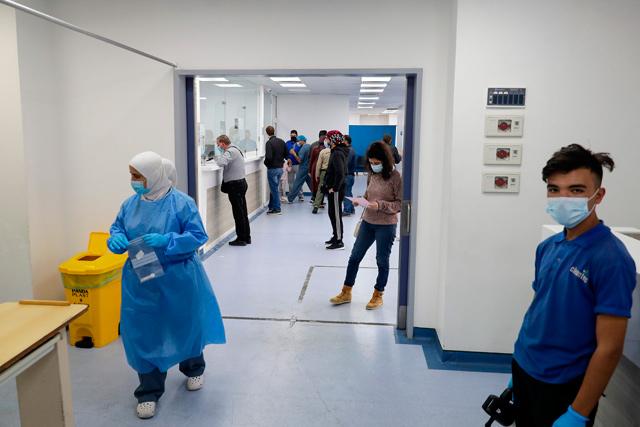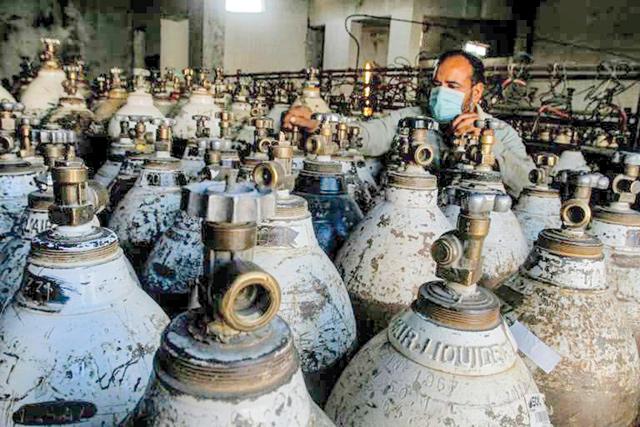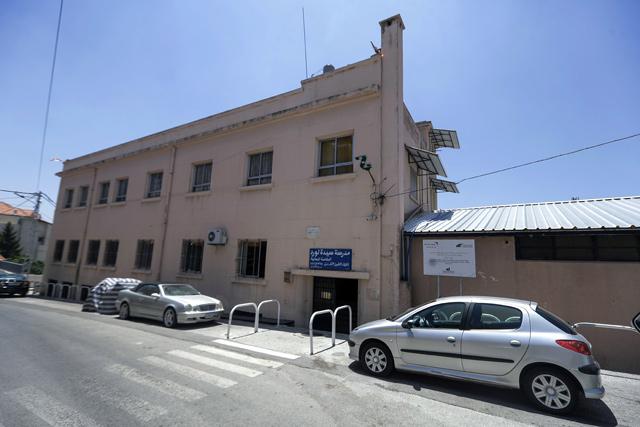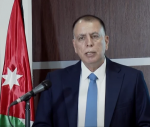You are here
Covid-19 hit Lebanese in desperate hunt for hospital beds
By AFP - Jan 05,2021 - Last updated at Jan 05,2021

People queue for PCR tests in the intensive care unit of the Rafik Hariri University Hospital in the Lebanese capital Beirut, on Tuesday (AFP photo)
BEIRUT — When Rachelle Halabi rushed her 85-year-old father to a Beirut hospital a few days ago with Covid-19, the doctor sent them home as intensive care was full.
“The ER doctor told us to go back, get him an oxygen machine and give him his treatment from home,” she told AFP from the Lebanese capital. “We went with it for several days, but his condition did not improve.”
Halabi herself tested positive for Covid-19, one of the thousands of new cases reported in Lebanon following a holiday season where loosened restrictions let infections soar.
With 192,000 reported cases and almost 1,500 deaths, Lebanon is not among the world’s worst hit countries.
But its infrastructure is crumbling, and a small surge in infections is enough to take its health sector to breaking point.
The health ministry has in recent weeks urged private hospitals to make more room for Covid-19 patients, but the pandemic is spreading too fast.
“The rise in Covid numbers has outpaced the increase in critical beds,” said Firass Abiad, the head of a major public hospital battling the virus.
Lebanese Red Cross president Georges Kettaneh told AFP the service was “transporting around 100 patients in need of hospital treatment a day”.
Halabi said she was turned away by several hospitals, and her hunt for a bed eventually took her outside the capital, to a private hospital in the city of Zahle, in the Bekaa valley.
Her father was given a bed in exchange for 15 million Lebanese pounds, equivalent to some $10,000 at the official exchange rate.
“What do you do if you can’t afford this amount?” she asked.
Her father had already had a narrow escape earlier this year, when a mammoth blast at Beirut Port in August devastated swathes of the capital.
‘Catastrophic’
As Halabi waited for her father’s transfer to Zahle, producer Jean Nakhoul was scouting for a hospital that would take his 83-year-old grandmother.
“The few hospitals that still have a vacant bed told us priority was being given to younger people, and that she would only be taken in if her condition became critical,” he said.
Nakhoul said that in the meantime, he had installed a ventilator and a pulse oximeter to her finger at home, to monitor and regulate oxygen levels.
Social media platforms are full of messages from distressed families pleading for help in finding a hospital bed for relatives.
Lebanon’s economy collapsed last year, and political paralysis and corruption are delaying any chance of a recovery.
The holiday season was seen by the government as a chance to inject much-needed foreign currency into the economy.
There were scenes of revellers thronging bars and clubs over Christmas and the New Year, when many countries were battening down the hatches.
But those now looking for space in full hospitals fear the price paid was a resurgence in coronavirus cases.
The government have announced a 6:00 pm to 5:00 am curfew, as well as a raft of other measures, will begin on Thursday.
Vaccines are still weeks away from arriving. Lebanon hopes to receive its first shipment of coronavirus jabs in mid-February.
“The situation is catastrophic, both in terms of the number of patients streaming in to the emergencies and how serious their case is when they arrive,” said Antoine Zoghbi, head of the emergency department at the Hotel Dieu hospital in Beirut.
Related Articles
DAMASCUS — The Syrian government on Wednesday offered 75 tonnes of oxygen to neighbouringLebanon during a visit by its health minister in re
ZAHLE, Lebanon — Inside the French-language school she has run for years in east Lebanon, Sister Colette Moughabghab welcomed parents
BEIRUT — Four decades ago, Lebanon used to export power to its larger neighbour Syria.

















